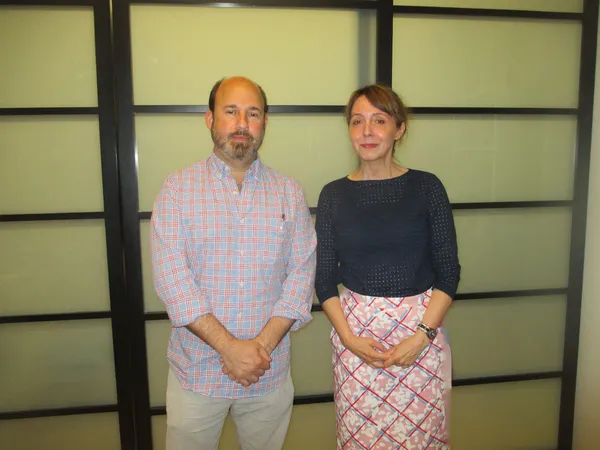 |
| Andrew Rossi (with Anne-Katrin Titze) on Okwui Okpokwasili in Bronx Gothic: "One of the things that I really responded to was the complexity of desire ..." Photo: Aimee Morris |
Andrew Rossi, who in his recent documentaries expertly juggled large numbers of people interviewed on screen - The Metropolitan Museum of Art exhibition China: Through The Looking Glass (curated by Andrew Bolton with Wong Kar Wai and Anna Wintour's Costume Institute Gala) in The First Monday in May, restaurant and university madness respectively in Le Cirque and Ivory Tower, and Page One: Inside The New York Times - in Bronx Gothic sticks mostly to his friend, writer and performance artist Okwui Okpokwasili, her family and frequent collaborator Ralph Lemon and films the final tour of her one-woman show.
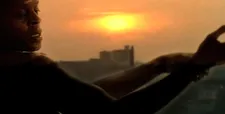 |
| Okwui Okpokwasili in Bronx Gothic |
Okpokwasili, who has also worked with Julie Taymor (A Midsummer Night's Dream), is intent on challenging unreflected notions of "the brown body." With humour, grace, sweat and the sharpest perceptions, Bronx Gothic gets us trembling and thinking with its protagonist. Somewhere, someone is losing control of the narrative and finds it again. This is fascinating because you cannot be certain if it is Okpokwasili, Rossi or yourself who has strayed from the path to discover a new world within the clutches of history.
Anne-Katrin Titze: You have some great shots of the audience. A man's eyes twitching. A woman with her mouth open.
Andrew Rossi: Yes, right, the one woman who is agape, completely. Yes, and then when she [Okwui] turns and sort of confronts the audience and engages with them directly, they are taking with them so many layers of perception of Okwui in her body, in her identity in that space.
AKT: I liked how Okwui is explaining how she sees the Gothic as "rupture that has never been sutured." Like an alleyway that you enter into and suddenly something unexpected happens. Did you ask her for a definition, how she would define Gothic?
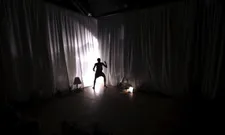 |
| Okwui Okpokwasili's Bronx Gothic: "The spaces are a metaphor for trauma and other memory attacking the consciousness in moments that are unexpected." |
AR: Absolutely. I wanted to understand how she viewed it as a Gothic work and she had many things to say about Gothic literature as well that we weren't able to include. But I think it's this general idea of spaces. The spaces are a metaphor for trauma and other memory attacking the consciousness in moments that are unexpected.
And even though the space of the performance of Bronx Gothic is just a box, it's a rectangle that is very open and everyone can see each other. She in her quake, in her dance, and in the fluctuations of her story, is creating these hallways and the story is non-linear and kind of moving in that same way.
AKT: The decorations are by her husband [Peter Born], right? Lamps growing out of patches of grass! Plastic bags floating above. Is there any more to know about those lamps?
AR: You know, I don't know. I didn't speak with them about the lamps but my understanding is it's almost like the debris of memory that is strewn around the room and that one sort of encounters.
AKT: The moment that struck a chord with me the most was the line: "Now as an adult, I'm having the dreams of my friend." I never thought about it before like this, but you connect in your memories fragments of what other people were doing and thinking. Childhood friendships can become a part of yourself. Did you feel a connection to that?
AR: Absolutely and I think it's this sort of mix, this soup of experience one absorbs in that very very vulnerable and sensitive moment in life. What Okwui is writing about is the girl kind of going through puberty, exchanging notes with a friend about sexual violence. And somehow the girl has absorbed the pain of her friend into her own way of understanding her sexuality.
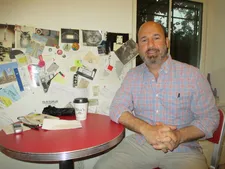 |
| Andrew Rossi: "I think that Okwui is synthesising many different conceptualisations of the body in American culture." Photo: Anne-Katrin Titze |
One of the things that I really responded to was the complexity of desire that is brought to life by these two girls. You know, they are just friends, then they are enemies, then they are sexual partners as well, as Okwui says. She says, "She would wreck me in alleyways", speaking of one of the other girls. And then, I think the tremendous surprise is that in fact these are all one girl. And the narrator is speaking about herself.
AKT: One who at the same time contains multitudes. It becomes universal. I saw it as an attempt to not leave little girls so vulnerable. Especially, as she puts it, "little girls with brown bodies". You show yourself on camera in the scene with the parents. The mother's traditional dance is a great moment. Was it difficult to convince Okwui or them to participate?
AR: It was definitely a discussion because Okwui had never shown her performances to her parents and she was afraid of their reaction. But we talked about it and she agreed. I insert myself into the scene for a couple of reasons. One, I wanted to reveal myself as the director, as a white man, and just show my identity in the space. But also it's a moment when Okwui almost seizes control of the narrative.
So we start at the beginning of the film with her coming down the stairs from her last performance, collapsing in the dressing room and saying that she is losing control of the narrative. But by the end of the film, even though we're sort of playing with time in reaching that point, she's actually seizing control of the movie. So we see that I am the director sort of orchestrating the scene but then she intervenes and starts asking questions of her mother and is in direct conversation with her.
AKT: Okwui's family is from Nigeria. There is the story of the Nigerian trickster god named Edshu that came to my mind. He has a hat that is red on one side and blue on the other and he loves to trick people, causing them to have quarrels over the colour of his hat.
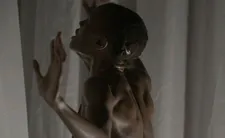 |
| Andrew Rossi on filming Okwui Okpokwasili's Bronx Gothic: "And immediately I thought I want to capture this before she will never perform it again." |
AR: Does he have a sort of pointed head?
AKT: Yes, possibly. I felt a trickster God quality in the performance.
AR: A hundred percent. And even Okwui's body movements evoke the deities of various … It's been a while. I took a class in college about Creole culture and the transmission of various African Gods into Western religion and in societies. And Okwui was in that class too.
AKT: That's how you know each other?
AR: That's how we know each other, from college. We did some theater together. I directed her in a play. We've been very good friends since then.
AKT: Why was now the time to make this film?
AR: I saw the performance in 2014, I was working on Ivory Tower, my film about higher education, and sort of registered in my head that I was so profoundly affected by it and I wanted to explore it more deeply. Then I got an e-mail from her company, the touring company, that they were on their final tour. And immediately I thought I want to capture this before she will never perform it again. So there was an urgency to it.
AKT: Some of the quotes really reverberate in the now - "Black flesh has a deep meaning in this country." The body in pain. There is so much that is still deeply unexplored. We are in such a limbo land.
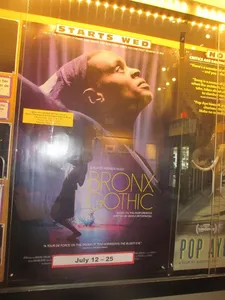 |
| Bronx Gothic poster at Film Forum in New York City Photo: Anne-Katrin Titze |
AR: I think that's right. I think that Okwui is synthesising many different conceptualisations of the body in American culture. There is not a lot of media that's being made, certainly in the mainstream media, that is really getting at these questions of the perception of the black body.
I mean we have certain sitcoms on network television that talk about the black experience, yes. But on that kind of granular level that Okwui is addressing it and in a somewhat conceptual academic way, I think there's not a lot of film and theatre that is getting at those questions in a way that she is getting at them.
AKT: You have that great scene in the car when she is discussing Roots, the TV series, with her husband. Did you poke to get them to talk about it?
AR: No. In interviews I definitely try to challenge the subject. When I'm shooting in vérité, it's observational. You know, that conversation completely came up spontaneously and I was just there to capture it.
AKT: Another great car moment [where the editing tells the tale] is when we hear Okwui talking about too much protection not being good for children. You show her with her arm around her daughter, her hand caressing her face. The ultimate gesture of protection. It's so funny because it's such a juxtaposition. It's lovely.
AR: Thank you so much.
Coming up - linking Bronx Gothic to The First Monday In May through the looking glass, Okwui Okpokwasili's gaze, Le Cirque and the three sons, and an invitation to Gay Talese from Andrew Rossi.
Bronx Gothic opens at Film Forum in New York on July 12.





















